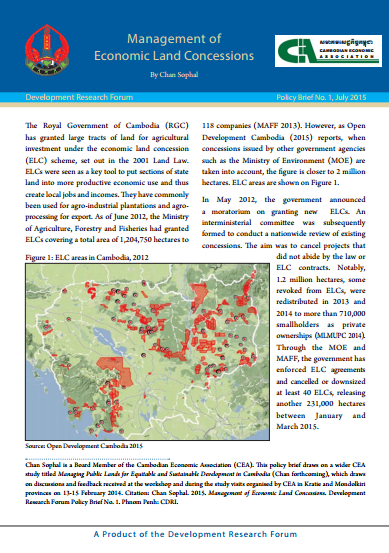Latest Entries
Open Budget Survey 2015
Publication Year: 2015 / Sources: International Budget Partnership (IBP)The Open Budget Survey is the world’s only independent comparable measure of budget transparency, participation, and oversight. Other public finance assessments mostly rely on government self-reporting, but the Open Budget Survey is implemented by independent researchers based in each of the countries surveyed who conduct analysis to determine the answers to 140 factual questions, and the results are reviewed by an anonymous expert.Governments in all survey countries are also invited to review and comment on the results, and many do so.
Download: English | KhmerOn Stony Ground: A Look Into Social Land Concessions
Publication Year: 2015 / Sources: Cambodian League for the Promotion and Defense of Human Rights (LICADHO)In March 2003, the Cambodian government unveiled a potentially progressive policy with the aim of transferring
land to landless and poor Cambodians – Social Land Concessions (SLCs).1 However, some of the first SLCs were implemented with a total disregard for the legal framework and failed miserably.2 The Land Allocation for Social and Economic Development (LASED) project was meant to prove that SLCs could contribute to reducing rural poverty by transferring land to landless Cambodians for residential and farming purposes.
Management of Economic Land Concessions
Publication Year: 2015 / Sources: Cambodia Development Resource InstituteThe Royal Government of Cambodia (RGC) has granted large tracts of land for agricultural investment under the economic land concession (ELC) scheme, set out in the 2001 Land Law. ELCs were seen as a key tool to put sections of state land into more productive economic use and thus create local jobs and incomes.
Download: English | KhmerCambodia: Addressing The Skills Gap
Publication Year: 2015 / Sources: Asian Development Bank (ADB) & International Labour Organization (ILO)Cambodia has made great strides toward sustained rapid and inclusive economic growth since its political environment stabilized in 1999. Its 7.8% average annual growth since then has dramatically brought down the poverty level, from 47.8% of the population living below the national poverty line in 2007 to a low 18.9% in 2012. However, 71.0% of Cambodians still live on less than $3 a day, which means that many of them remain vulnerable to falling back into poverty.
Download: English | KhmerDemocracy, Elections and Reform in Cambodia
Publication Year: 2015 / Sources: COMFRELThe Committee for Free and Fair Elections (COMFREL) in Cambodia has since 2009 extended its observations and analysis of the electoral process to include the overall process of democratization process. The analytical reports on the state of democracy titled ‘Democracy, Election and Reform’ are published annually and disseminated to all interested national and international stakeholders.
Download: English | Khmer




